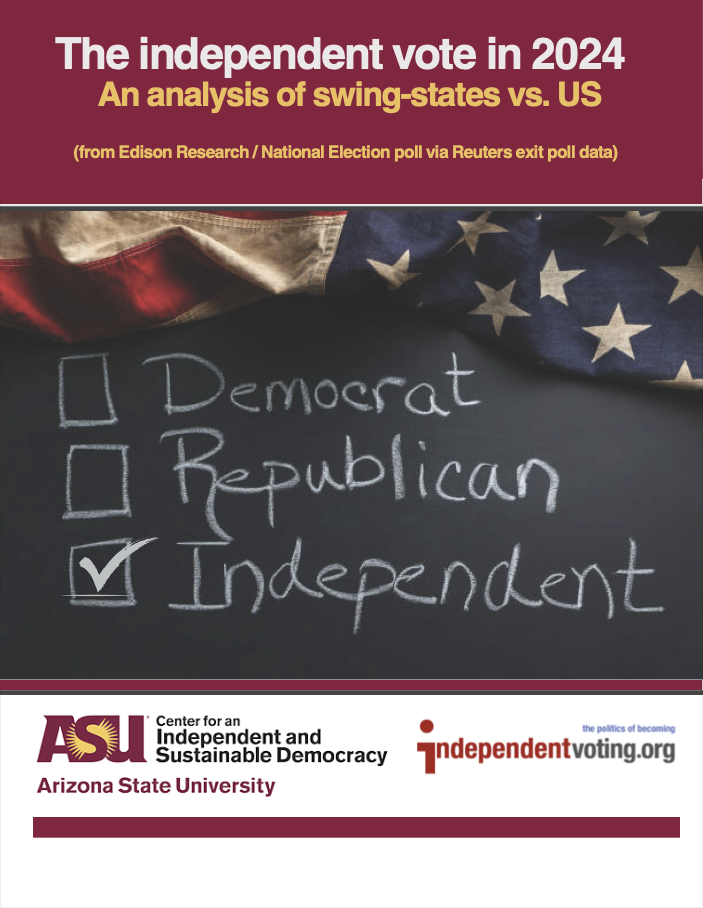
The Center for an Independent and Sustainable Democracy at Arizona State University aims to foster and support thoughtful, innovative research, policy briefs and forums around the state of American Democracy. The two-fold focus is on exploring nonpartisan reforms and redesigns of federal, state and local governance of electoral structures, and a deep dive examination of the independent voter
Two new academic articles have been published Full texts can be found in Research
“Understanding the Gen Z Independent Voter: An Exploratory Study,” by Thom Reilly and Dan Hunting,published in Politics & Policy, surveyed 1,315 registered Arizona voters ages 20–30. It finds Gen Z is notably more likely than party-affiliated peers to identify as independent and more often Latino, yet they vote less frequently. Gen Z independents mix issue positions—aligning with Democrats on some topics and Republicans on others—while showing deep skepticism toward the party system: most say the two major parties aren’t serving the country, and over two-thirds believe the current political system isn’t working for their generation. The study also maps information sources, perceived voting barriers, and what might motivate higher participation.
“Partisan Election Administration in America: How Major Parties Shut Out Independents and Minor Parties” by Thom Reilly, Jeremy Gruber, Dan Hunting, and Karen Reill, published in the journal, Election Administration Research & Practice, reviewed all 50 state election codes. It finds that the two major parties have embedded rules that disadvantage independents and minor parties: 45 states limit key election roles (boards/canvassers/poll workers) to Democrats and Republicans, 27 bar independents/minor parties from serving as election judges, 26 give major parties privileged access to voter data, and 24 advantage them in campaign-finance provisions; importantly, these restrictions are not correlated with whether a state leans Republican or Democratic, how elections are supervised, population, or region. The authors conclude that U.S. election administration’s partisan “parity” model is increasingly vulnerable and argue the U.S. should explore nonpartisan administration, the norm in other democracies.
The Center for an Independent and Sustainable Democracy releases:

Presenters:
Dan Hunting
Thom Reilly
Jacqueline Salit
Cathy Stewart
David Belmont
Download
Study Highlights:
In 2024, independents surged to 34% of voters (up from 26% in 2020), slightly trailing Republicans (35%) and topping Democrats (31%). Nationally they split 49% Harris / 46% Trump / 5% other, but Trump carried independents in the swing states of Arizona, Pennsylvania , North Carolina, Georgia; they split in Nevada and leaned to Harris in Michigan (+4) and Wisconsin (+1). This was a reversal from Biden’s 13-point indie win in 2020. Independents skew younger and more male, with the largest share in ages 30–44, and they dominate among 18–29 voters (38% of that bloc). They’re more likely to call themselves moderates. Moderate independents alone made up 18% of all voters, and while they lean slightly Democratic down-ballot (49% straight-D vs. 34% straight-R), they remain far more ticket-splitting than partisans (10% nationally; 7–14% across swing-state Senate races). Issue priorities put democracy (41%) first, then the economy (31%); they trust Trump more on crime/safety/immigration, Harris more on abortion, and are split on the economy; many Harris-voting independents were chiefly anti-Trump. Broadly, independents blend social tolerance with fiscal awareness, reject incumbents
Independents are an emerging force in American politics. They characteristically combine views of most adherents of the major parties, being more socially tolerant and fiscally aware than their partisan counterparts. They are also more likely to be split-ticket voters than the two major parties’ backers and seem to have a notable affinity for rejecting the incumbent.
The trend towards independence is especially apparent among younger generation voters, who tend to identify as independents more than older voters. Over half of younger Americans identify as independents. Millennials and Gen Z voters are less likely to join traditional political parties due to dissatisfaction with the status quo, increased polarization, and a desire for new approaches to governance.
As these generations become a larger portion of the electorate, their voting habits—especially among independents—will have an increasing influence on election outcomes. Candidates that ignore this bloc risk alienating an important segment of the population.
This changing shape of the electorate calls into question the two-party formula that has long dominated and defined the American political landscape.
[1] The number of “interviews” conducted in the state-based polling:
AZ – 1876, GA – 4406, MI – 2863, NV – 3514, NC – 3784, PA – 3004, WI – 2961


